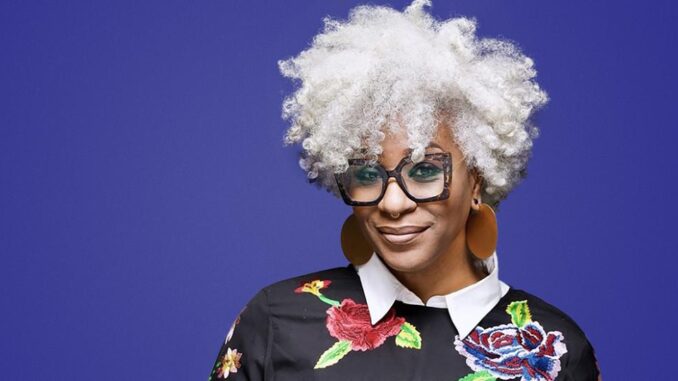
Joy Duckett Cain – (www.sistersletter.com) – Omisade Burney-Scott brings together Black women for a life-changing conversation about the change of life. We needed to hear this.

With the emotional and financial support of friends and supporters, Omi did something very few Black women get a chance to do — she took a year off to envision what the next phase of her life would look like. “I really wanted to have conversations with other Black women around how they’re navigating life,” she says. “What does love look like? What does rage look like? What does grief look like? How are you changing, how are you feeling about your body? What risks are you taking, whether it’s risks with relationships or risks that you’re taking around starting a new job or creative venture. I wanted to talk to folk who looked like me.”
The result: In 2019 she launched her monthly podcast, Black Girl’s Guide to Surviving Menopause. From that grew in-person (pre-pandemic) and virtual (post-pandemic) events that brought hundreds of sisters together to speak their truths and explore ways in which they could heal physically, emotionally and spiritually. And as the world opens up again, Omi continues to emerge as a thought leader. Her podcast provides a safe, multigenerational space where topics like gender identity, body imagery, spirituality, death and colorism can be explored. Here, Omi drops a few pearls of wisdom she’s gathered along the way.
On menopause: I think menopause is a portal to the next iteration of yourself. We’re still emergent; it doesn’t matter how old you get, there is no shelf life on being emergent. Menopause is one of those portals that we kind of enter into that’s unchartered territory. When we emerge on the other side, we are absolutely transformed, for better or for worse. And you deserve support, you deserve kindred, you deserve friends, you deserve people who are journeying as well to talk about what they know, to talk about what they’re experiencing.
On Black women. Black women are spectacular, but there’s a heavy energy out there that people are always wanting us to save them. I think that’s very heavy and it’s not fair. Sometimes we can’t even figure out how to save ourselves. But then we turn around and what do we do? We put you on this shoulder, and this person on that shoulder, and somebody on this hip, and someone else on our back. And everybody is comfortable but you. Everybody is being carried but you. Black women are spectacular — of course we are. Black women are strong — of course we are. I would love for us to take better care of ourselves. I would like for exquisite care to be extended to us by people who look like us, by people who say they love us, and I would like us to be protected — and I mean all Black women — whether that’s cis, hetero or trans — I want us all to be safe.
On self-care: Self-care is more than a spa day. Self-care is choosing you every single day. And choosing you can look like a lot of different things. Choosing you can look like rest and reclaiming rest. Choosing you can look like what you eat. Choosing you can look like how you move your body. Choosing you can look like therapy. Choosing you can look like boundaries in relationships. Choosing you can look like quitting that job or quitting that relationship. So self-care is really you centering yourself, and that’s not selfish. It is centering.
On death: Death is not the end, it’s a transformation. And everybody who is intimately involved in that particular death moment or someone’s death journey is transformed. Whether it’s the person leaving this place physically or the family members that are the caretakers, everybody is transformed by death.
Black people believe that we speak power into the world. [We] say ‘Don’t speak death over someone, don’t do that, don’t say that.’ And I try to flip it and say, you’re not speaking death over someone by talking about death, what you’re doing is actually talking about how much you love that person and how you want to honor that person all the way through everything they’re experiencing. That’s not speaking death over them. That’s speaking love.
On what she’d say to her younger self: If I could go back and talk to my 30-year-old self, I’d be like, Gurl … you’re about to have a whole-ass life. A whole lot of stuff is going to happen. Trust your gut, believe what you see, listen more than you speak, lean on your friends — they got you — and lean on your ancestors, they got you. All is going to be well. It’s not going to always feel like it, but all is going to be well. Trust your gut.


Be the first to comment